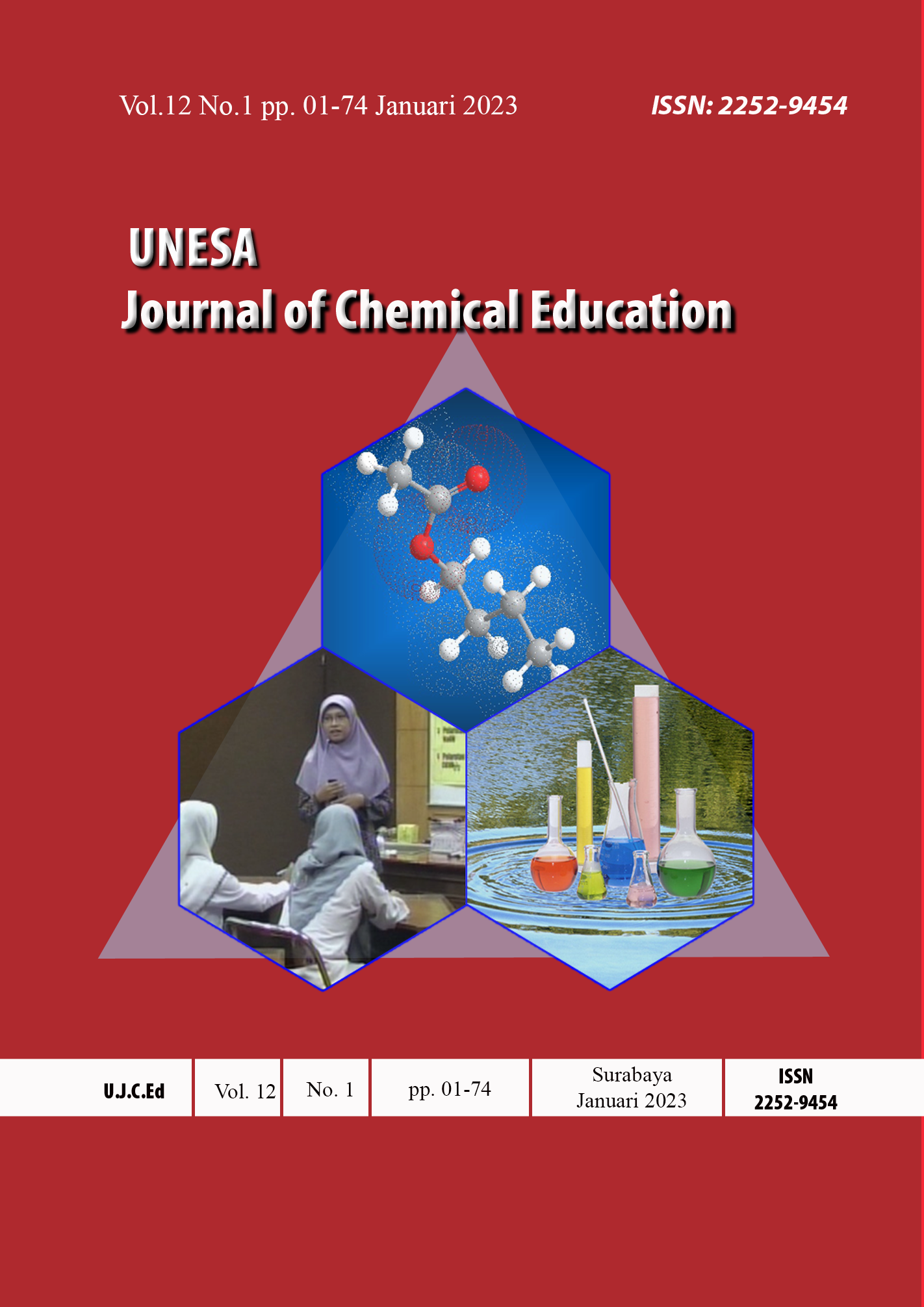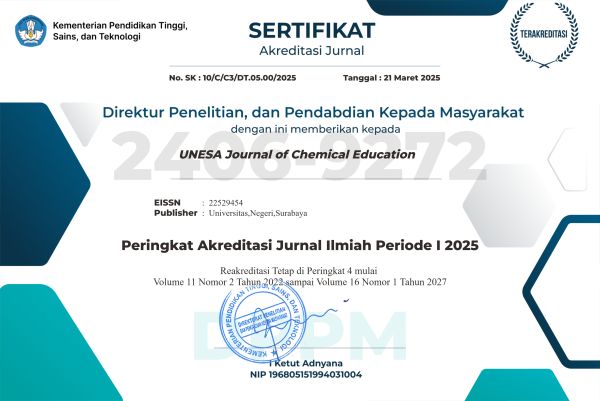DEVELOPMENT OF E-MODUL FLIPBOOK BUFFER SOLUTION BASED ON DISCOVERY LEARNING MODEL
DOI:
https://doi.org/10.26740/ujced.v12n1.p8-16Keywords:
ADDIE, E-Module, Buffer SolutionAbstract
This research and development aim to produce a valid, practical, and effective e-module buffer solution flipbook. The development of this e-module refers to the ADDIE development model which includes the analysis stage, the design stage, the development stage, the implementation stage, and the evaluation stage. There are four subjects in this research, namely media experts and material experts as validity test subjects, chemistry teachers as the practicality test subject,ct, and 35 students in class XI MIPA 3 as the practicality and effectiveness tests subjects. The instruments used for validity are validation sheets by media experts and material experts, practicality, namely observation sheets on the implementation of e-module, teacher and student response questionnaires, and effectiveness, namely learning outcomes tests. The results of this study are: (1) the validity of the digital module from the material expert is 3,6 and the media expert is 3,5 which is in the very valid category with a consistency test between validators are 100% which is in very high criteria, (2) the average percentage of e-module practicality is 85,66%, where the percentage of practicality based on the questionnaire responses of students and teachers the to the digital issue is 85,33% and 86% in the very practical category, 3) e[1]module meet the effective criteria (≥85%) based on the achievement of class completeness with percentage 88,57%. Based on these data, it is concluded that the e-module flipbook buffer solution developed with the ADDIE model is valid, practical, and effective for use in learning.
Downloads
References
Kurniawan, C., dan Dedi K. 2021. Pengembangan E-Modul Sebagai Media Literasi Digital Pada Pembelajaran Abad 21. Lamongan: Academica Publication.
Shobirin, M. 2016. Konsep dan Implementasi Kurikulum 2013 di Sekolah Dasar. Yogyakarta: Deepublish.
Anwas, O. M. 2013. Peran Teknologi Informasi dan Komunikasi dalam Implementasi Kurikulum 2013. Jurnal Teknodik, 17(1).
Marsita, R. A., et al. 2010. Analisis kesulitan belajar kimia peserta didik SMA dalam memahami materli larutan penyangga dengan menggunakan two-tier multiple choice diagnostic instrument. Jurnal Inovasi Pendidikan Kimia, 4(1), 513-520.
Sariati, N. K., et al. 2020. Analisis Kesulitan Belajar Kimia Peserta didik Kelas XI Pada Materi Larutan Penyangga. Jurnal Ilmiah Pendidikan dan Pembelajaran, 4(1), 86-97.
Arsyad, A. (2010). Media Pembelajaran. Jakarta: Raja Grafindo Persada.
Himmah, E. F. 2019. Pengembangan E- Modul Menggunakan Flip PDF Professional Pada Materi Suhu dan Kalor. Skripsi. Lampung: FTIK UIN.
Hidayatullah, M. S., dan Lusia R. 2016. Pengembangan Media Pembelajaran Berbasis Flipbook Maker Pada Mata Pelajaran Elektronika Dasar di SMK Negeri 1 Sampang. Jurnal Pendidikan Teknik Elektro, 5(1), 83-88.
Gunawan, H. 2018. Efektifitas Penggunaan e-Modul Terhadap Keaktifan dan Hasil Belajar Peserta didik. Prosiding Seminar Nasional. ISBN: 976-602-52451-0-7.
Meliawati, R. 2019. Pemahaman Konsep Sifat Jari-jari Atom dan Keelektronegatifan pada Mahasiswa Pendidikan Kimia Semester IV Tahun Ajaran 2016/2017 Hasil Pembelajaran Menggunakan Model Discovery Learning. Jurnal Ilmiah Kanderang Tingang, 10(1), 38-45.
Rayanto, Y. H., dan Sugianti. 2020. Penenlitian Pengembangan Model ADDIE dan R2D2: Teori Praktek. Pasuruan: Lembaga Academic & ResearchInstitute.
Salsabila, Unik Hanifah., et al. 2020. Pemanfaatan Teknologi Media Pembelajaran Di Masa Pandemi Covid-19. Jurnal Pendidikan Dasar, 2(2), 1-13.
Aldoobie, N. 2015. ADDIE Model. American International Journal of Contemporary Research, 5(6).
Harjanto. (2008). Perencanaan Pengajaran. Jakarta: Rineka
Yamasari, Y. 2010. Pengembangan Media Pembelajaran Matematika Berbasis ICT yang Berkualitas Seminar Nasional Pascasarjana. X-ISBN No 979545-0270-1.
Fuad, A., Hilda K., dan Muhiddin P. 2020. Pengembangan Media Pembelajaran E- Magazine sebagai Sumber Belajar Biologi Peserta didik Kelas XII. Jurnal Biology Teaching and Learning, 3(1), 38-45.
Slameto. 2010. Belajar & Faktor-faktor yang mempengaruhi. Jakarta: Rineka Cipta.
Syahbana, A. 2012. Pengembangan Perangkat Pembelajaran Berbasis Kontekstual untuk Mengukur Kemampuan Berpikir Kritis Matematis Peserta didik SMP. Jurnal Edumatica, 2(2), 17-26.
Helaluddin., dan Hengki W. 2019. Analisis Data Kualitatif: Sebuah Tinjauan Teori & Praktik. Jakarta: Sekolah Tinggi Theologia Jaffray.
Lasmiyanti., dan Idris H. 2014. Pengembangan Modul Pembelajaran untuk Meningkatkan Pemahaman Konsep dan Minat SMP. Pythagoras: Jurnal Pendidikan Kimia, 9(2), 161-174.
Downloads
Published
Issue
Section
License
The license terms of the Creative Commons Attribution-NonCommercial 4.0 International (CC BY-NC 4.0) requires attribution to the original creator, permits non-commercial use, and does not allow for the application of legal or technological restrictions on others' use.
 Abstract views: 215
,
Abstract views: 215
, PDF Downloads: 183
PDF Downloads: 183













